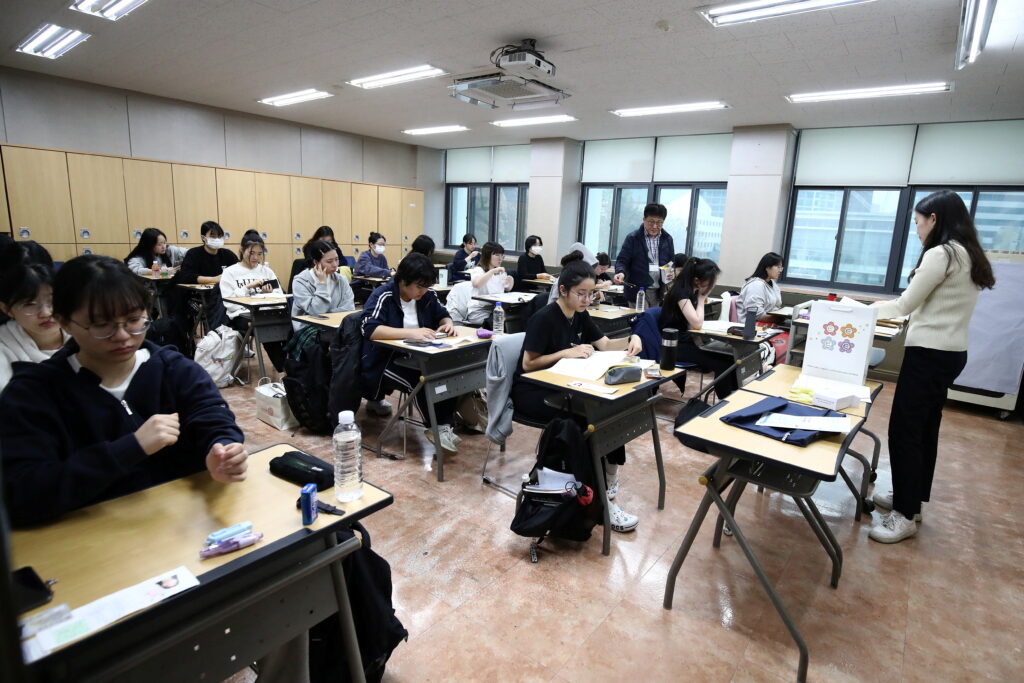China has seen a dramatic decrease in the number of international students from South Korea. Between 2017 and 2023, there has been a precipitous drop of 78 per cent, from 73,240 to just 15,857 South Korean students studying at Chinese higher education and foreign language institutes.
China’s zero-COVID policy, tensions over the US Terminal High Altitude Area Defense (THAAD) system and South Korean business retreat from China have all soured the perception of China as a destination for international students.
Fresh in the minds of South Korean students are the strict lockdowns that marked China’s approach to controlling the spread of COVID-19. For international students away from their families and other social support networks, the isolation during these lockdowns was especially traumatic. Troubling tales of students’ experiences have circulated, tarnishing the image of China as an attractive higher education destination. Despite China’s efforts to facilitate the return of South Korean students after COVID-19, such as by introducing a special exception to reinstate student visas, students remain reluctant to study in China.
But changing perceptions of China in South Korea predate the pandemic. Geopolitical competition between China and the United States led to tensions after South Korea agreed to host a THAAD radar in 2017. In response, South Korea witnessed a shift in treatment from China, including a steep drop in Chinese tourists and international students to South Korea. Seoul also faced unofficial economic and cultural backlash that damaged South Korean higher education, exports and businesses. Though these actions communicated Chinese displeasure, they also undermined economic integration between Beijing and Seoul.
In response, many South Korean businesses have shifted their focus from China and have begun pursuing alternative investments, which has in turn changed the way that China is perceived in South Korean society. China was once seen as a land of opportunity, but now faces low public sentiment in South Korea.
This low sentiment is rooted in concerns about China’s image in the international community, the quality of higher education in China and the possibility of worsening bilateral economic or cultural conflicts in the future. The withdrawal of South Korean businesses has also meant fewer opportunities for South Koreans in China. This has contributed to the exodus of South Korean expats and a darkening outlook for international students in China.
The drop in South Korean students to China is part of a larger trend. As South Korea continues to suffer from population decline, there are fewer students ready to enter higher education each year. Overseas degrees have also become more common, decreasing their value in the local labour market.
As a result, fewer South Koreans overall are seeking tertiary education abroad. According to the South Korean Ministry of Education, between 2017 and 2023 the number of outbound international students declined by 51 per cent from 239,824 to 123,181. Decreases in outbound students have been notable in Australia, the United States and Japan, though China has seen a disproportionately larger drop.
Under the current conservative government in South Korea, the trend of fewer students heading to China will likely persist. The recent warming of South Korea–Japan ties suggests an effort to move even closer to the US-led security order in East Asia and farther from China. The South Korean government is beginning to express concern about Chinese territorial disputes and Beijing’s increasingly assertive foreign policy. Though the recent landslide victory of the opposition in parliamentary elections could spell change, it remains to be seen how or whether this will impact South Korean foreign policy.
A major improvement in South Korea–China relations and a growing exchange of international students seem unlikely in the near term. Meanwhile, Chinese calls to avoid politicising economic issues and for a positive, objective and friendly China policy from South Korea are unlikely to find sympathetic ears in Seoul.
Peter G Ghazarian is Associate Professor of Higher Education Leadership at State University of New York at Oswego.


Leave a Reply